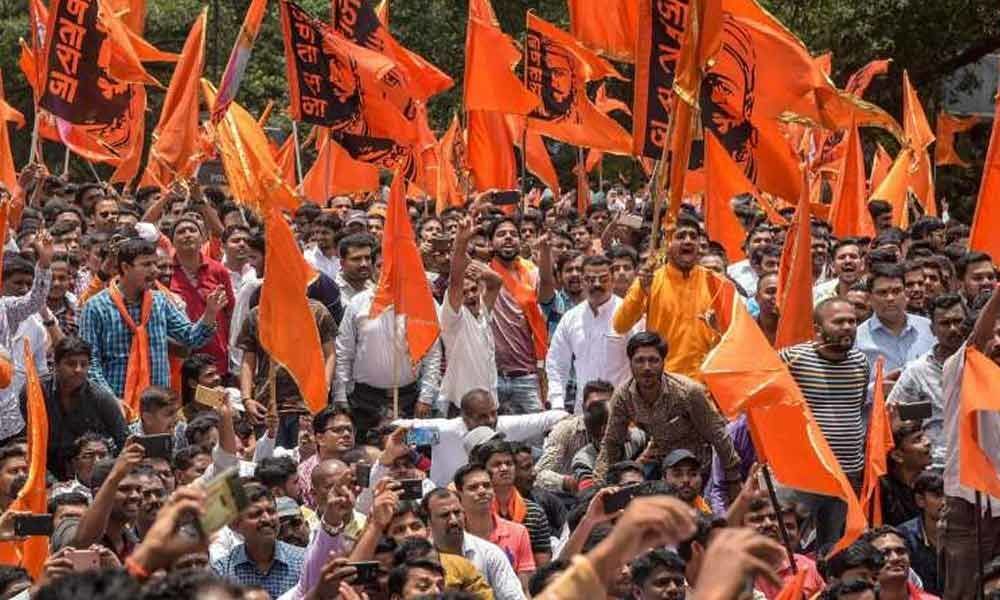Live
- Deep State behind Adani crisis?
- Collector inspects GGH; asks staff to provide better medicare to poor
- Zero Case: A Saga of Eradication of Polio in India
- Cancel PPAs with Adani companies, demands CPI
- Nuclear saber rattling in Russia-Ukraine war
- AKNU V-C attends GEO India-2024 conference
- SSSG student selected for national painting contest
- Focus on studies, avoid societal vices: SP Krishnakanth
- Naredco donates Rs 75L to CMRF
- Capacity building workshop held
Just In
Plea in SC challenging grant of quota to Marathas in education, jobs in Maharashtra


The plea, said the SEBC Act, which provided a 12-per cent and a 13-per cent quota to the Maratha community in education and jobs respectively breached 50 per cent ceiling on reservation fixed by SC.
NEW DELHI: A plea has been filed in the Supreme Court challenging the Bombay High Court order which upheld the constitutional validity of the quota for the Maratha community in education and government jobs in Maharashtra.
The plea, which might come up for hearing next week, said the Socially and Educationally Backward Classes (SEBC) Act, which provided a 12-per cent and a 13-per cent quota to the Maratha community in education and jobs respectively, breached the 50-per cent ceiling on reservation fixed by the apex court in its landmark judgment in the Indira Sahwney case, also known as the "Mandal verdict".
Sanjeet Shukla, a representative of "Youth for Equality", an NGO, claimed in the petition that the framing of the SEBC Act for Marathas was done under "political pressure" and in "full defiance" of the constitutional principles of equality and rule of law.
"The high court erred in concluding that the mere fact that other OBCs would have to share their reservation quotas with the Marathas (if the Marathas were simply included in the existing OBC category) constitutes an exceptional circumstance warranting a breach of the 50 per cent ceiling limit set by Indira Sawhney," the plea filed by advocate Pooja Dhar said.
The Bombay High Court, in its June 27 order, said the 50-per cent cap on reservation imposed by the apex court could be exceeded only in exceptional circumstances.
"The majority in the Indira Sawhney case held that the ceiling limit of 50 per cent was a binding rule and not merely a rule of prudence," the plea said.
It said the high court's order upheld a 65-per cent reservation in Maharashtra (there being no community hailing from far-flung or remote areas), which was contrary to the nine-judge bench decision of the Supreme Court in the Indira Sawhney case.
"It is evident that the Maharashtra government has made a mockery of the rule of law. It has also used its constitutional powers arbitrarily and purely for political gains," the plea said.
It said the SEBC Act was "unconstitutional" for violating the Bombay High Court's 2015 order without removing its basis, overstepping the constitutional limitations contained in the 102nd amendment to the Constitution and for merely succumbing to political pressure, in complete violation of the constitutional principles of rule of law.
According to the 102nd amendment to the Constitution, reservation can be granted only if a particular community is named in the list prepared by the president.
The plea further claimed that the Bombay High Court "erred" in concluding that the mere fact that 85 per cent of Maharashtra's population was "backward" was so extraordinary as to warrant a breach of the 50-per cent ceiling limit.
It also claimed that the high court overlooked the fact that Marathas occupied 40 per cent of the government jobs available in the open category.
"The high court overlooked the fact that the Gaikwad Commission itself recorded that the Maratha community forms only 19 per cent of the population, which shows that the assumption behind the SEBC Act that Marathas constitute 30 per cent of the population was bad," it said.

© 2024 Hyderabad Media House Limited/The Hans India. All rights reserved. Powered by hocalwire.com






